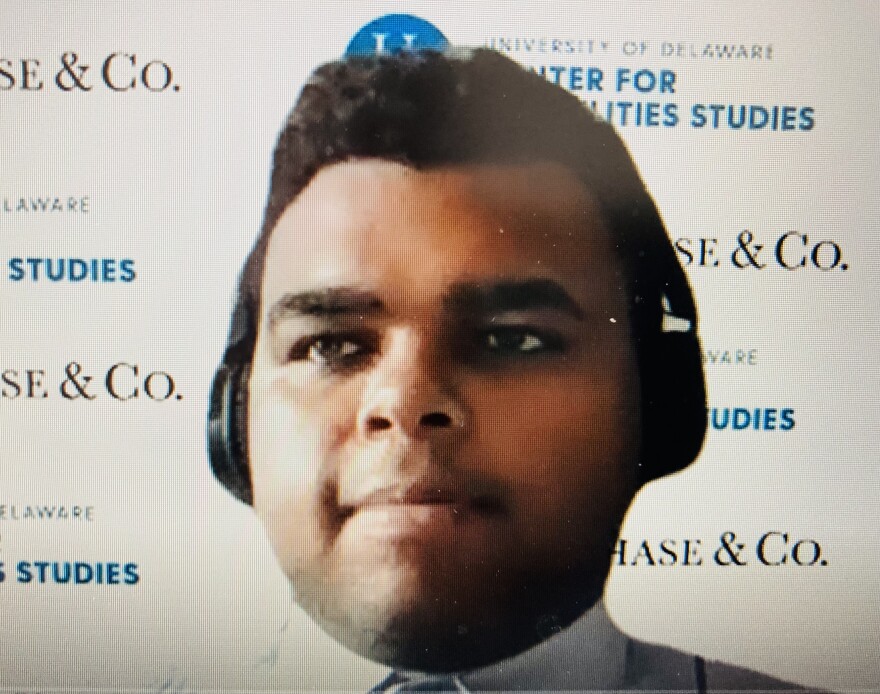Employment rates for people with disabilities are much lower than for people without disabilities.
A program at the University of Delaware aims to change this for young people on the autism spectrum.
Delaware Public Media’s Sophia Schmidt reports it seeks to build equitable pathways for them to succeed in their careers.
MichaelBrandon Arocho has quite a few passions.
“Where do I begin with that one,” he said.
Arocho writes movies, which he hopes to start shooting in the near future. He’s also studying Japanese.
“It started as a hobby and I'm hoping to make it my minor in school, actually.”
The 20-year-old pursued another of his passions, programming, through his first internship this summer, with a University of Delaware chemistry professor.
“You're essentially taking data from a graph—a pencil and paper graph—and putting it into the computer. The program that we're working on will be able to take the data and show you this in real time,” Arocho said. “It's basically a digital, editable graph.”
Arocho is a student at UD, in the school’s Spectrum Scholars program for students on the autism spectrum.

A major focus of the program is career development. That’s because young people with autism are underrepresented in the workforce. One high-profile study known as the National Longitudinal Transition Study-2 found just 58% of young adults with autism spectrum disorder who’d been in Special Education had ever worked in their early twenties.
The Spectrum Scholars program, administered by UD's Center for Disabilities Studies, launched in 2019. This summer, members of its first cohort of five students finished internships—at the University, at Friendship House and at JPMorgan Chase.
“I want to give the students the credit—all the credit,” said MaryEllen Stephens, career coordinator for the Spectrum Scholars program.
Stephens tells her students over and over, “the more experience you have, the better you look on paper.”
“The resume-building experiences, all of these hands-on experiences, not only build their skills, build their communication, but they build a portfolio,” she said.
It’s hard for many people to get their first job out of college. But Brian Freedman, who runs Spectrum Scholars, says autistic people might face added barriers—like outdated misconceptions, low expectations or an interview process not built for them.
“Typically this is done in a very conversational manner where there's back and forth questions and answers, regardless of whether or not having a verbal back and forth question and answer is going to be a part of that person's job,” he said.
But it’s not that hard to tweak hiring policies to be more inclusive, says James Mahoney, who started the Autism at Work program at JPMorgan Chase. It can be great for companies, too.
“In technology, as an example, we always say we want people who think outside the box, because it will lead to greater credit productivity,” he said. “One could argue that people on the spectrum live outside the box every day. So why not bring that value in?”
JPMorgan is an official partner of the Spectrum Scholars program. The company launched Autism at Work in 2015, and has since hired more than 200 employees with autism worldwide.
Mahoney says the company adapts its interview process for autistic candidates. For example, managers avoid asking questions involving conjecture, like ‘where do you see yourself in five years?’
“We avoid panel interviews, which can be overwhelming to anyone,” Mahoney adds.
Autism at Work also trains managers on how to give useful feedback to employees in the program and offers accommodations, like noise-cancelling headphones.
But Mahoney says people hired through the Autism at Work program are doing the same jobs as everybody else. Often, they’re doing them better.
“Importantly, we founded this on a premise of talent,” he said. “In other words, we weren't doing this to be charitable.”
Amarachi Anuma is another member of the first class of Spectrum Scholars. Now a junior at UD, she’s studying economics and finished an internship this summer at the nonprofit Friendship House, which provides services to people experiencing homelessness.
Anuma says the internship taught her nonprofit administration skills, which she thinks will be applicable to her career goal of working in government on international business development.
Anuma feels the Spectrum Scholars program helped her land the internship.
“I was just getting rejected from internships left and right, and I was kind of feeling discouraged,” she said. “My career coach from Spectrum Scholars, she helped me to prepare for the interview [with Friendship House]—and I felt the interview went well.”
As for Arocho, he thinks his internship this summer will help him get toward his dream job—to be a videogame designer.
“I want a high-position job … working on video games,” he said. “I want to work on the technical aspect and the visual aspect.”
In the meantime, he’s back in school, where he says the Spectrum Scholars program has helped him succeed.
“I think that without it, I'd still be a little less confident,” he said. “They really help with not just setting up opportunities for employment or helping with class, but they really help with being able to socialize, being able to be a part of the community.”
The Spectrum Scholars program has grown each year and recently accepted nine new students into this year’s cohort.
This story has been updated.





